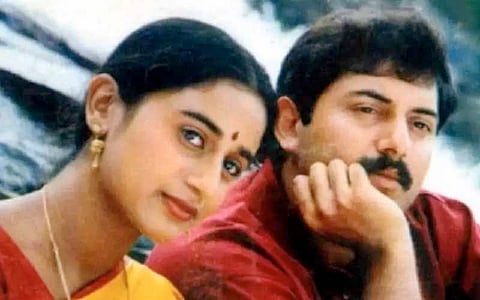
- In-Depth Stories
- Web Stories
- Reviews
- News
- FC Lists
- Interviews
- Features
- FC SpecialsFC Specials

Indira released on May 11, 1995. Indira, the debut directorial of Suhasini Mani Ratnam, opens with sounds of chaos over a black screen. Women cry, cattle moo in fear, there are roaring explosions, and children wail. In a brief moment of apparent silence, the words "Saadhigal Illaiyadi Paappaa, Kula Thaazhchi Uyarchi Sollal Paavam" (There is no caste, dear child, to discriminate is sin) by Subramania Bharati, appear over the cold black screen, only to fade as we hear the antagonist Kotamarayar (played brilliantly by Radha Ravi) exclaiming "Yevan ya sonnadhu saadhi illanu?" (Who dares say there is no caste?) A quarter of a century later (the film released on May 11, 1995), people still wrestle with that question on every platform.
It is unbelievable that a film like Indira does not find its way into conversations about pioneering Tamil films. It is a firm tale of how compassion can win over discrimination. As a kid, Indira (the titular character played by Anu Hasan in a fantastic debut) along with her family is forced out of their village, along with other 'lower caste' people. Growing up, she is unable to spend time with her high-school friend from the other village, outside of school. Later, she witnesses her father (Nasser) being stabbed to death, and when she takes his place to fight for her the oppressed people, she too gets physically harassed and assaulted. But she sticks to her stand, educates children on equality, challenges the establishment, fights her fears and inner demons, and when the opportunity to draw revenge presents itself, she champions peace – as it rightly should be. That way, Indira is also an honest female empowerment film. Essentially, Indira is the kind of film we should be getting when films are marketed as being "women-centric" or batting for "female empowerment".
Who is Indira?
Indira is not a know-it-all; she is not a snowflake. She is naive – of how ruthless the establishment can be, but also of her own ability to lead people. After her father dies, when the people consult her for advice, she directs them towards her timid uncle. However, being irked by the listlessness of the 'panchayat' and with some encouragement from her city-educated beau Thiyagu (a wonderfully restrained Aravind Swami) and another uncle (Janakaraj), she steps up and suggests her opinion. Finding sense in what the young girl says, the people embrace her lead. She does not recognise her leadership qualities until then, and once she does, she is bolder than ever. When a couple of her community kids are thrashed for wearing slippers and bathing in the pond meant for the privileged caste, she gets every kid from her community to walk with slippers and dive into the pond. And when the Kotamarayar gang shows up, she sends them off with a stare.
Another instance of Indira needing support is when she gets physically assaulted. The men of her village are enraged and vow to raze Kotamarayar's village to the ground. But, in all innocence and hope for peace, Indira goes to meet Kotamarayar and talk things out. But, he delivers the now-cliched line "Saadhi raththathula oori pochu" (Casteism is my blood). Indira has a brief Thevar Magan (1992) Kamal-moment of how she does not belong here among these barbarians. But in a beautiful reversal of roles, Thiyagu (who had earlier held a similar opinion, until Indira convinced him otherwise) encourages her to stay firm in her fight for equality.

Technical excellence
Santosh Sivan won the Tamil Nadu State Film Award for Best Cinematographer for Indira. The movie itself received a Special Jury Award. The cinematography is a joy to behold and so is the composition of shots. Editing is by B Lenin and VT Vijayan, and one of my favourite transitions comes early in the film. A young Indira has just witnessed a gruesome murder and her father comforts her saying "Nee periya ponnaa agarthukulla ellaam maaridum ma" (These things will change by the time you grow up), and we see the image of weeping Indira, resting her head on her father's shoulder. The image dissolves to the image of an older Indira resting her head on the trunk of a tree singing the intro to the song 'Ini Achcham Achcham Illai' which she teaches the kids in her village. Composer AR Rahman gives us an album that's probably the most under-appreciated by the current generation. While 'Thoda Thoda Malarndhadhenna' and 'Nila Kaikiradhu' are delicate and moving, the album has the extremely funky 'Odakara Marimuthu' too, where Aravind Swami is a charming ball of fun.
I'm not sure how the film was received, especially commercially, back then. But the fact that it is Suhasini's only directorial feature till now is rather unsettling. Is it the theme of caste? Or the women-centric script? Or, does it have to do with the mishmash of TamBram features in the oppressed-community household of Indira? But, in a time post the arrival and success of films such as Pariyerum Perumal and Nerkonda Paarvai, and a more receptive society, maybe it is time for Suhasini's second feature!